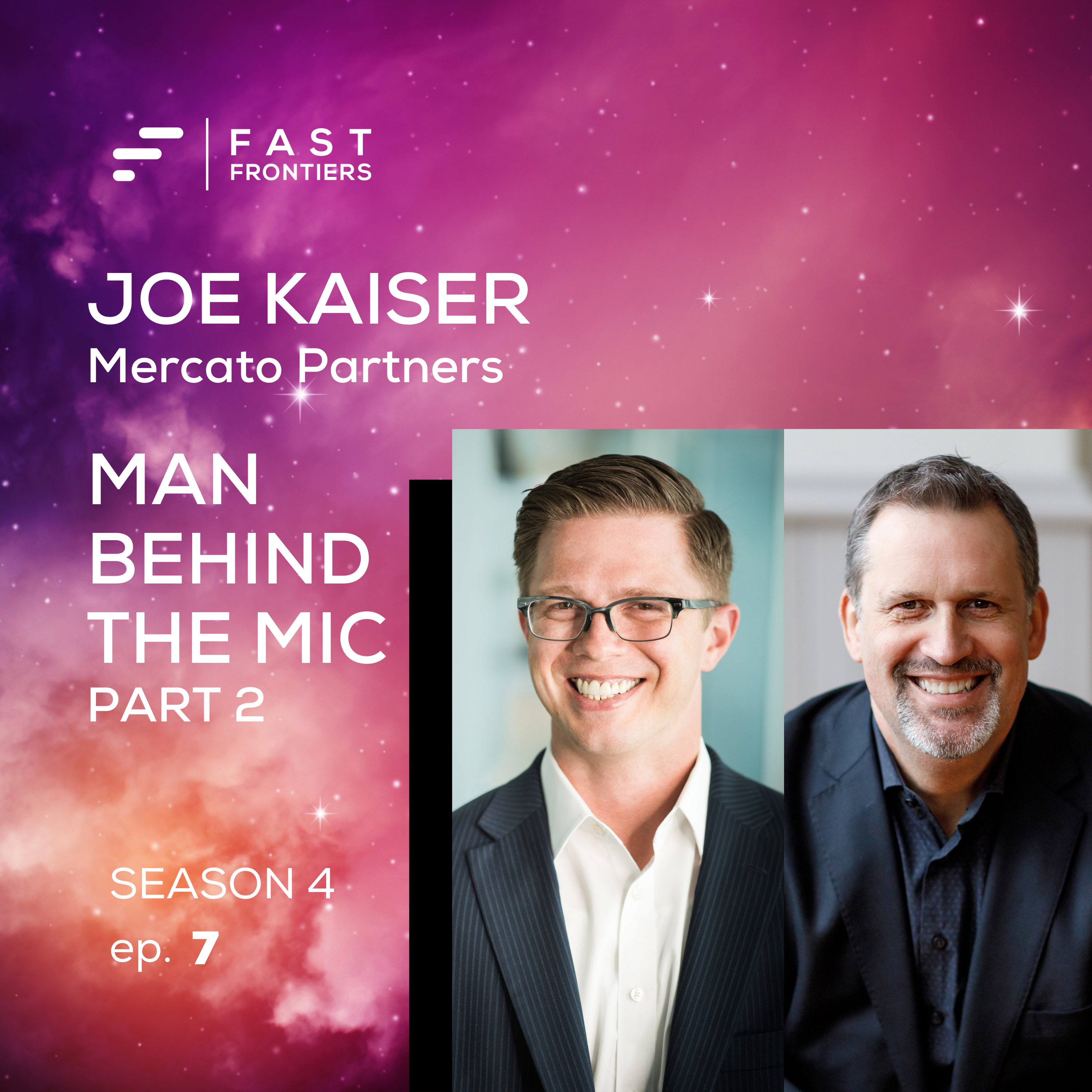S4 Ep 7. Man Behind the Mic Part 2: Interview by Joe Kaiser at Mercato Partners
- 0.5
- 1
- 1.25
- 1.5
- 1.75
- 2
Tim Schigel: Welcome to Fast Frontiers. I am your host, Tim Schigel, Managing Partner of Refinery Ventures. In today's episode, we're continuing with part two of the Man Behind the Mic conversation with our friend, Joe Kaiser. Joe is director at Mercato Partners, a private equity firm, where he leads their investment efforts in the Midwest, as well as their performance team. Again, we want to express our deep gratitude to Joe for coming up with this great idea and giving his time and his thoughtful questions. He was kind enough to switch seats with me for this episode. For part two, Joe asked my thoughts, advice, rules, principles, guidelines about how I approach venture capital. Please enjoy part two of my conversation with Joe Kaiser.
Joe Kaiser: A lot to unpack, but if we role play and I'm a CEO, I've done as you've said, I've implemented these early growth lessons. My company's on fire, I've attracted the attention of a number of investors and I get an unsolicited term sheet, how should I think through, I don't need this much capital and or I was thinking about fundraising but not for a couple of quarters. How should I think through this particular moment? Or is this an opportunity? Or should I pause that investor and try to circle back to that at a later time?
Tim Schigel: A couple ways to process that and a couple principles.
Joe Kaiser: Well, I promised I wouldn't make it easy on you, Tim.
Tim Schigel: Yeah. The first principle is the best time to fundraise is when you don't need to fundraise. Find that it's really easy, if you believe in your mission, fundraising gets a lot easier, because like I said to my wife, when I'm fundraising for the fund, "Imagine waking up every morning knowing that 99% of the people are going to tell you no?" It's just going to happen.
Joe Kaiser: So true.
Tim Schigel: And you just keep smiling and you keep going. If people are calling you as an entrepreneur, say, "Hey, we want to invest. We want to invest." That's a good sign. The question is why? Do they know what you do? Or they just heard good things about you? Is it rumors? Whatever. But then I would go to evaluate that I would say, "Well, is that the right person? Is it the right time? Is it the right amount?" And so the next kind of principle I guess is do your homework. And you know of entrepreneurs think of the investors as service providers but they should, because they just want to get the money but you can be picky. And the sooner you figure that out, the easier it gets. You really only want to be talking to investors who can help you and help your business. And the way to find them is to look at other companies you aspire to be like and find out who their investors were and go talk to them. Because you'll find that they get it. You'll find you can raise money without having to pitch that. Because they understand the shorthand. And I kind of learned this lesson at Cintrifuse when I was trying to help entrepreneurs and several times this happened where they would come and want my help. And they would just give me the list of the Midas list of VCs and say, "Hey, can you make introductions for me?" Just complete shotgun approach to just, I'm like, First of all, no, it's not my job to do this research. Second as the CEO and founder, you need to understand your market. You need to understand who funded your competitors. Who's funding other people in the market. You're going to benefit by knowing all that. It's not enough just to know your product. You got to know what everybody else is doing. And through that, you'll usually find a list of investors that's less than 12, probably less than six or eight. And then second step then ask for help for introductions not the other way around. Open ended introductions never work. I encourage CEOs to do that homework at every stage of investing.
Joe Kaiser: And Tim to that end, I think you mentioned before that you spend such a small amount of time helping your portfolio companies fundraise but I think this is one of those instances where it's quality over quantity. Can you talk about some of the things that you do to communicate about your companies with growth stage investors and sort of grease the skids for your CEOs to have those conversations.
Tim Schigel: Absolutely. I think every again, every stage of investor, this is an important part of your job is you're sourcing by looking earlier and you're thinking of next funds by looking up the people later. And that's you and I get together, your partners or others, I have standing meetings with a lot of different firms. I view those later stage firms, ones that are doing the bigger A's and B's and C's as it helps to just think of them as customers. You're looking for companies of a certain profile that's a later in larger profile than where I'm looking but I'm hoping my companies get to your point. I want to ask you, "What do your companies need to look like? How much have they raised before? How fast was their growth," blah, blah, blah. And that helps me with my companies because now I know what you're looking for. And then it helps me with my, I think of it as the inventory. Our portfolio is our inventory. These are the things I have to sell you, Joe. And do you like any of them? And again, if the companies are good and healthy and growing and you have attractive inventory. And people want to know what's going on, just as we do with seed funds. We're not going to do all your companies but there might be a little tasty morsel in there. Or a little bobble that is sparkly that we like.
Joe Kaiser: Or whale in some instances.
Tim Schigel: Or a whale. Whatever it is. A joke, but you don't want to overplay your hand. And I think good investors smell that pretty quickly when somebody's overselling what they have, whether it's an entrepreneur or a VC and their portfolio. You got to make sure you have the goods. But ultimately you, as the downstream later stage investor, you'll figure out whether you like it or not. I shouldn't have to sell you too hard if the results speak for themselves. And this is maybe for other people just getting into VC and stuff, yes, you want to hustle. You want to network but don't run the risk of overselling that every company in your portfolio's great and awesome. And don't get discouraged when somebody passes because it's just the nature of the beast. The key is to just keep the network and the relationships of people. And again, treat them like customers. If you invest in one of our companies, I want you to be happy. I want it to be a good outcome for all of us. I don't want you to find out that you bought our lemon.
Joe Kaiser: Tim, how do you counsel your companies, particularly in a market like now where there is so much capital moving around? How do you coach them on maintaining efficiency from a capital deployment standpoint inside of the business but at this sort of simultaneously pull plan for that next round of funding?
Tim Schigel: If the market's there and available and you can raise money and your high growth aspirations and you have aspirations to being a market leader, you should probably raise it because you don't know how long that door's going to be open. And once a company has established certain market leadership and they're executing and growing the next probably one of the most important differentiators they have is their balance sheet. The war chest because it discourages others from investing in the space. Why should we go raise $5 million? Astronomers raised a 100 and something. It helps separate you from the pack. It helps you survive any kind of market downturn but you do have to be careful. I do worry, especially in this environment that if your plan is all just momentum at all costs and you real under underlying economics aren't there, you could get caught flat footed. Not always. And this comes from having survived through the bubble and then after the bubble in 2008, et cetera, I saw this happen with companies, even that would go public, that we would take public. That it was all momentum, which is good while it lasts. And the moment that reverses, any weakness in your business model, all of a sudden can be the end of it. But it's hard to do. When it everybody's flattering you and you're raising a lot of money, I want people around me, advisors and board members that are still being critical and objective and challenging, not just popping champagne all the time, but saying, "Are we sure that really works? Are we sure the customers are going to keep paying us? Are we sure we're going to get those margins we thought we were?" It's more art and science probably. But I think the first step is just being aware of it. Is the value proposition, execution and growth of the business matching up with the myth and the mystique of the business when things are great?
Joe Kaiser: And I guess just continuing on that thread, moments like financing as almost like spy movies. You always hear that James Bond or which whichever the character is saying, they never want to enter a room where there's only one exit. And so I think it's a similar analogy for the financing moment is particularly at the growth stage, it offers you an opportunity to test the market at least from an exit standpoint. How do you counsel your companies in terms of, now maybe that time where we should think about exiting or conversely they get an inbound offer and now we're weighing, should I take a financing term sheet? Or should I really lean into this LOI?
Tim Schigel: Yeah. No, I love that. We just had an exit recently, Halo Health was just acquired and it was that sort of situation. Great company, I think first a 100% cloud, a 100% mobile clinical workflow in hospitals that goes in and sells at not just the hospital level, the whole system level. Really breakthrough company but they were hit by COVID and we were investors and Bain and everything shut down. Nobody was buying anything. Obviously that depleted some of the cash reserves so things were coming back and have been coming back, which is great, the company was getting inbound interest from strategics. And so they were facing that question. Do we raise more money for that growth or do we sell? And so ultimately they took to sell because the founder really wasn't confident that the market was going to roar back anytime soon and really didn't want to take that dilution and find out that we're still not out of it yet. And it's going to take longer even yet. Ultimately that's one of those decisions that does come down to the founder and I've been on boards, we're voting for that. And oftentimes if you have the right investors, the investors are going to defer to the founders and say, "Hey, what do you want to do?" I like capital efficient so I'd rather not raise more. But the second thing that I run into a lot and I try to help entrepreneurs understand when they're going through that choice is if you don't have offers for both, you don't have a choice. In those situations, an ideal situation you'd have term sheets or offers for both an acquisition or a financing so that you could truly decide which one's going to be a better path, not just a hypothetical. Now that takes a lot of work and you don't always get that but in ideal world that is what you would have so you'd really understand where you stand. If you're raising more money, you look at what your post money value's going to be and say, "Okay, most investors expect to at least double their valuation every 12 to 18 months." If you're not confident that you know how to, let's say your post money's 200 million, you take this 40 million and you're not confident the company's going to be worth pre money of 400 million in 12 or 18 months, you might want to reconsider what path you're on. If you're confident, then great, do it. But it's not always that clear.
Joe Kaiser: Yeah. That's a great point.
Tim Schigel: But it's funny how many people try to just make a decision when they really don't have a decision. They only have one of those options at the table. And this is something I saw in the fund to funds in other venture funds, the venture funds I thought that did the best job, had some of the best returns quickly understood which of their companies were potential home runs and which ones were doubles. And if you got a company that's going to be probably a double, no matter what, would you rather get double your money now or double your money in five years? Plus or minus.
Joe Kaiser: Straightforward, straightforward.
Tim Schigel: Pretty straightforward. The key is then, and the best funds do this, the key is helping convince and influence the CEO and founder that that's also in their best interest instead of waiting around. And the good funds help those companies get to an exit, get that W, get the win. At the end of the day that's what the market remembers. They remember, hey, you had a good company and you monetized it. People made money. That's a good thing. And then you can go out and do something else. That's one of the things that we're focused on is helping the entrepreneurs understand that and understand those trade offs. And it may seem from a vanity standpoint, really cool to go raise a big round of capital but it's going to be even cooler to sell and exit when everybody makes money.
Joe Kaiser: Exactly. So true. I'm going to throw you a curveball, Tim. I've heard for them a lot of founders, not a lot, but a fair number of founders that say, "My investor board members pointed me in a direction and I didn't agree with them but I followed their advice anyway and it didn't work out." How would you advise entrepreneurs that aren't getting advice from you, when it's appropriate to go with their intuition or go with their data versus following the direction of board members?
Tim Schigel: Speak to this one from personal experience, which was the company I created ShareThis. The lesson I learned in that, I tried to build consensus. I'm somebody who seeks advice and counsel from other people so I'm not hey, it has to be my way. We went down a path that ultimately I probably should have resisted and done and relied more on what I thought was the right thing to do instead of what everybody else thought. And it turned out the path was a bad path. And so something I counsel entrepreneurs on all the time is, first of all, definitely want to leverage your board and your advisors. You want to seek out their opinion. They're going to have different opinions. You want them to have different opinions. And it can be frustrating if you're new to this, because how do I assimilate this? Your job is to synthesize all that but ultimately pick the direction that you're comfortable with. You're running the company. You run the company the way you see fit. Some people don't need that help. Some people have enough self confidence and ego and everything else that they're going to do that anyway. But I don't know what your experience is, but mine is, most people fall into the, especially if they're good, if they've raise money and others, they value other people's input. They're not the dictators. They want to do the right thing. But sometimes that could be confusing when they're getting conflicting input.
Joe Kaiser: Completely.
Tim Schigel: Does that make sense with your experience?
Joe Kaiser: It does, Tim. It does. And it's interesting, I think you mentioned it earlier but the compelling thing for me about heartland founders is the lack of ego. And sometimes it's almost to their detriment. How do you coach your founders and CEOs about that balance of speak load but also let's moderate the ego. How do you help them find that balance or think about that balance?
Tim Schigel: Well, I'd like to think that I do a decent job trying to filter and find those people before investing in the ones that already have some of that balance. And by looking for people that maybe our hyper- growth leaders already, they've already been through that fire. Hopefully they've experienced some of that but we do have some founders that are new and CEOs that are new, that are going through that. And that's the best part and that's why I do what I do with Refinery is to have those conversations with the founders to hopefully maybe share some of my experiences, where I've gotten burned and didn't do the right thing and see if I can help them benefit so that they can overcome that. One other is just transition from founder to a new CEO like we did in Astronomer. We took a lot of care, I think, and time to make sure that it was done right and that they were effective. When it happened to me, when I voluntarily said, "Well, yeah, we'll bring another CEO and I'll be chairman." That was on Friday, on Monday, there was a new CEO and I was chairman and then the world started changing and there was no thoughtfulness to how to make that transition happen effectively. And that was one of the big problems. I think it's obviously being involved, having the discussions with the CEO, getting to know them, getting to know their team, seeing how they operate and just like any other kind of good coach, give them those tips in real time, the tips or observations in real time to say, "Hey, did you consider this? Or what do you think about that?" One of the things that's been really helpful for that has been Zoom. We have one of our CEOs who does it, by default. Basically records everything, all their meetings, internal and external and often will share them with me or with the board to say, "What do you think?" And I was like, wow, I never really thought of using this as a coaching tool but it's super effective for it. And you can really say, "Hey, did you notice in that meeting you kind of had this burr in your bonnet and you were really pushing for this and that. And I could see somebody over there squirming. They clearly had an opinion but you never really asked them for it. You just kind of steamrolled them." "Oh my gosh, did I? I didn't notice." And that could be super helpful to somebody. Again, not trying to be picky and overly critical. You got to know when you're invited to provide some of that advice and feedback. But in this case, definitely was. I think that's been a wonderful tool from that standpoint in terms of leadership coaching.
Joe Kaiser: And it brings up an interesting point too, for those investors that are listening in and that are early in their careers, finding that balance of knowing when you should say something to your CEO, it's a coaching moment, but not needing to be, let's say the smartest person in the room. Come at it with a sense of humility. I think is finding that balance is such an important skill for investors to learn.
Tim Schigel: Yeah. I got into venture when I was 30, 31 so I learned those lessons the hard way. I was young guy on the board that might have understood technology but I didn't have the life experiences some of the people had and it was hard for me to share those things in that way. And it's hard to, I don't know if you can teach somebody that, some people are sometimes wise beyond their years, which is excellent. But many of us are just young and naive and optimists and we say stupid stuff and we talk when we shouldn't talk and it may or may not be effective but that ends up how you learn. And that's why I always say my bookshelves are filled with leadership and psychology books, not technology books. The technology stuff is kind of easy, it's people. Matter of fact, for anybody working at a university that has an entrepreneurship program, scrap all of it and just have your students manage people.
Joe Kaiser: I couldn't agree more, Tim.
Tim Schigel: Just take on projects, give them challenges as teams and see what they do from a leadership standpoint. Because most of what you do as a entrepreneur leader is manage people, recruit people, manage people, get them, develop them, get joy and satisfaction, excitement out of developing them because that's the only way you're going to grow. It's the number one thing. It's the hardest thing. I'm still learning myself. I have my own advisors that advise me that have been through this stuff. That's the fun part about the job. That's part of why this is the job I have for the rest of my life. I don't believe in retirement. My advisors have each created venture firms that have around for 30 years and they're still sharp, active. Anybody I know who's been sharp and active in venture, you just stay young. You're around new ideas, young people, challenging situations. The more you're around it, the more you have to offer. And it's just, I can't imagine a better kind of career path.
Joe Kaiser: What I hear a lot from LPs and investors and even some founders, less founders, but definitely the prior two categories is with the adoption of Zoom and these other connectivity tools that we have now and that are so broadly dispersed that yes, talent and startups are becoming distributed across the country and around the world but every company should be run like a company in the Bay because they're all the same. A startup is a startup wherever we are. And I think you and I would agree that that is just fundamentally not true. How do you think though about the future of building companies in markets like Cincinnati or Toronto for that matter, versus if we're sitting in Palo Alto or the meat packing district in New York?
Tim Schigel: Yeah, I think there are definitely lessons you can take from Silicon Valley but trying to transplant Silicon Valley to Cincinnati doesn't work. It needs to be organic but there are definitely lessons and some principles you can take from there, for sure. But I think preserving the culture, one of the best examples there might be Scott Dorsey, who we've had on Fast Frontiers, the founder and CEO of ExactTarget in Indianapolis. He built that built huge company, went public that sold to Salesforce and they had a desire to do it there and do it the way they did it. And they clearly borrowed or shared some similarities with a Silicon Valley company but definitely also Midwest and hometown company as well. I think it's important not to lose that element. One of the three things that we try to work with companies on, in that early scale stage is culture and this again came from my own experience, having done it wrong, where when you grow from 20 people to 60 people going to a 100 people, it breaks everything that was working before it. Just communications all of a sudden gets exponentially more complicated and people associate principles, behavioral principles in the company as coming from the founder. My manager just told me to do this and that was really rotten thing to do and that must have come from a mandate that the founder had. And it hit me like a ton of bricks when that happened to me and I realized that it was not enough just to kind of take my own persona and style with our management team and whatnot and just assume it was happening. You have to be explicit, especially if you're going to grow the company and bring more people into the fold and want them to be effective. You have to start thinking it's part of the scaling. What's the culture that we want to have? What's the culture we're going to create here? And how do we codify it? And not just codify it, not just put it on a wall but how do we live it literally every day? Every day, every kind of decision making you should tie to reason we made that decision is because of these cultural principles. If that's happening, then your culture's working properly. It's something that I emphasize to our founders who haven't been through it or don't necessarily know that's what's coming around the corner is if they start growing like that, they need to embed that in part of their culture. We like to make it part of their OKRs. For a year or a quarter, if you have three to five OKRs, one of them should be about your culture and your people.
Joe Kaiser: Yeah. I have the distinct pleasure of working with Alex Frommeyer at Beam Dental, who you've also had on as a guest. Tremendous CEO but I was with Fro a couple weeks ago when we were having lunch. And he said, I can't remember the exact percentage, but anyone that spent time with fro knows he has an exact percentage of time that he spends focused on the team and focused on just culture building and culture maintenance. And Tim, that is such a great point as you are the keeper and standard bearer of culture when you're the CEO of a business.
Tim Schigel: Yeah. There's a lot of things that you can delegate and that you should delegate as you're growing. That one, you cannot. You just can't. And so I think you started the question with the whole remote work stuff that we're currently in. There's a lot of that and I think it makes it really hard. I don't think it's going to last, I think it's added a new element of flexibility for all of us. Some days I can work at home. Some days I can work at office. There's no stigma associated with that. We've shown we can be effective. Most people can be effective at both. Not everybody. And some people are better when they work from home. Some people are definitely not. I think there's going to come back to some kind of equilibrium. I think we are a social animal. We need the social interaction. I think the people that are going to win are going to come up with creative and innovative ways to create opportunities for more physical proximity for people to get together. And that hopefully won't be too far away but we now have the added element of the remote and the Zoom calls that help to, we can hire now talent that might not be in our local market. We can be more effective across time zones, et cetera. It'll be interesting to see what comes out of it but I don't think it's going to be where we are today. It's going to move away from this to something still more back to more in person in some form.
Joe Kaiser: Yeah. Yeah. And I think that is why this distributed nature of entrepreneurship that we're experiencing today will be persistent, is because people now have the opportunities to have houses instead of apartments and have front yards. And you get used to this lifestyle and it's as a former New Yorker, I can say, it's hard to imagine transitioning back to that condensed lifestyle, once we've gotten comfortable. And I believe at least that, this sort of network effect, this coffee shop effect of that's now happening in places like Cincinnati, will be persistent and people love where they live now. And so I think as you talked about, the eventual request to move back to home base is going to face resistance and people will want to build companies in markets like Cincinnati.
Tim Schigel: Yeah. I think it's a great outcome that people are going to have that flexibility to see what it. I've always said, you shouldn't have to trade off between building a great company and a great family.
Joe Kaiser: So true. Well, Tim final question for you that I have and this is a question that all of my CEOs have learned to put up with, it's that I'm not smart enough to have all the answers or all the questions so which question was I not smart enough to ask you today?
Tim Schigel: Maybe it is, so how do I deal with adversity? How do I deal with it when everything seems against you and the chips are down or things that you don't expect, catastrophe happens? We're doing this podcast here in my podcast studio, worldwide headquarters, my guitar's in the background. My guitar studio, man cave. A couple years ago, when we moved into this house, we did some renovation and this room didn't exist. My daughter and wife designed and built this room but we were renovating like the master suite and whatever and different contractors were coming in and out of the house. And when the work was about done, it was first week of January, I was at lunch. My daughter calls me. She was home from college, middle of the day and she's crying, hysterical. Somebody broke in the house while she was at lunch, she came back and the door was open and somebody came in and stole all my guitars and our TVs, stuff like that.
Joe Kaiser: Wow.
Tim Schigel: Of course I raced home, a bunch of police were there trying to figure out what did they take? Was anybody hurt? Most importantly, is she okay? She's okay. She's freaking out and she's crying and they took your babies and all this stuff. I'm like, "No, that's stuff. We can get stuff again. Matter of fact, I'll probably have fun getting more stuff." While I'm trying to get as much as I can for the insurance companies and I'm going to take two years replacing it and try to have fun with it. And part of that reaction was, yeah, I was upset but I was trying to model for my daughter, my kids too, you got to put this stuff in perspective. It wasn't going to be product or healthy for me to go off the handle, freaking out and what does that say? What does that show her? You are going to get curve balls in life. Things are going to happen. Expect it. Try to figure out how you can maximize your learning from it. What I learned is I should have put the Ring doorbell system up sooner. We were a little late on that. I think also, kind of having kids, raising kids, my kids are all adult kids now but also helps you as a VC too. I try to put that adversity in, like I said, in perspective. I used to say, somebody would ask," What's it like being an entrepreneur?" I say, "Well, some days it feels like you're on top of the world and other days the world's on top of you." The key thing to remember is it doesn't last forever. It may seem like the worst thing in the world. Your customers got mad because your employees screwed something up. Somebody stole something. Whatever it is, okay, let's figure it out. And you know what? The sun will come up tomorrow. It's not going to last forever. It may last a week. It may last longer than you want but it's not going to last forever. You'll get over it. And I think that's potentially the most helpful thing you can do to think about how to overcome adversity, get through it and ultimately lead other people through it. Not just yourself but then your teams.
Joe Kaiser: That's right. And of all the Tim's rules of business building, that's probably my favorite one is just roll with the punches. Be authentic, enjoy the journey to the degree you can. That's the best one yet.
Tim Schigel: Awesome. Well thank you for doing this, Joe.
Joe Kaiser: Tim, it's my pleasure. I aspire to be like you.
Tim Schigel: Oh gosh.
Joe Kaiser: This has been, it's always fun to catch up and to bask in your experience and brilliance.
Tim Schigel: Oh, get out. All right. Now you got to invest in some of our portfolio companies. Come on.
Joe Kaiser: Count on it. Count on it.
Tim Schigel: All right, man. Thank you.
Joe Kaiser: Thanks, Tim.
Tim Schigel: Thank you for listening to our fourth season of Fast Frontiers. We appreciate our listeners for their continued support. We continue to have an amazing time connecting with new and old friends, bringing you great conversations about how innovation's accelerating in unexpected places. We hope you have a wonderful holiday season and we will be back in season five next year. Thank you again and see you soon. The Fast Frontiers podcast is brought to you by Refinery Ventures. Our producer is Abby Fittes, audio engineering by Astronomic Audio, marketing content and social media support from Content Callout and our podcast platform is Casted.
DESCRIPTION
Today we're continuing with part two of the Man Behind the Mic conversation with our friend, Joe Kaiser. Joe is director at Mercato Partners, a private equity firm, where he leads their investment efforts in the Midwest, as well as their performance team. For part two, Joe asked my thoughts, advice, rules, principles, guidelines about how I approach venture capital.
Today's Host

Tim Schigel
Today's Guests







